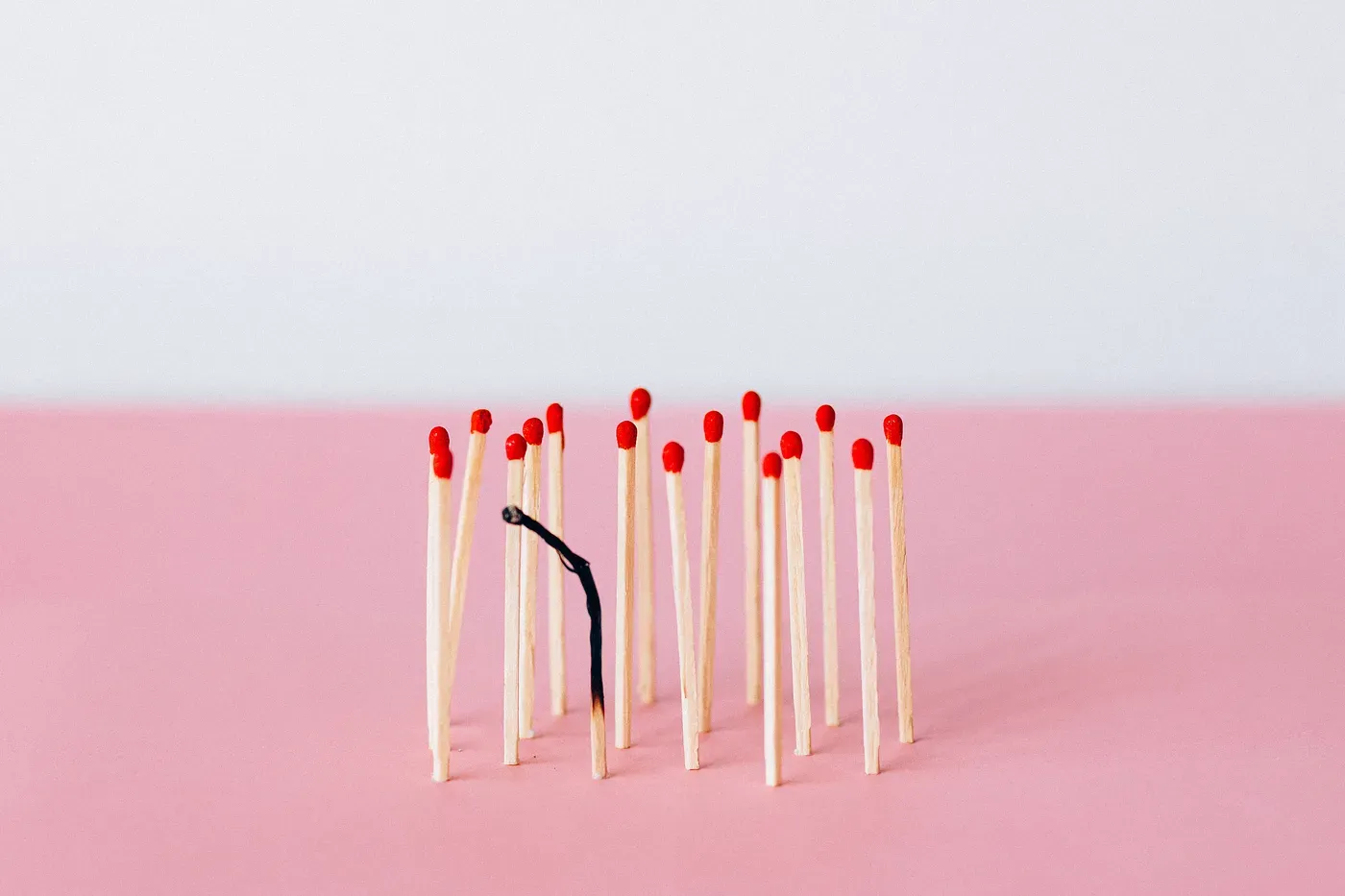How to avoid burnout and stay productive.

If you’ve ever burned yourself out, you know what happens: Suddenly, you’re tired, irritable, and everything seems like a huge struggle. Your brain feels foggy and your body aches from working too much — and there’s nothing worse than feeling like this when you don’t have to! Burnout doesn’t just make life harder for ourselves; it can also start affecting our performance at work and even lead to health problems down the road. So we need to take action before we reach that point of no return where we feel so drained that taking any kind of break is impossible. Fortunately, there are lots of things that can help prevent burnout before it starts.
When you reach burnout, you’re just running on fumes.
When you reach burnout, the only thing you can do is slow down and take care of yourself. You won’t be able to function at your best, which means that you’ll be more prone to mistakes and less productive. You’ll also be less happy and irritable — even if your job involves doing something as simple as watering plants or filing papers.
Burnout isn’t just a bad day here or there; it’s a sign of deeper problems with how we interact with our work environment. It’s important not only to recognise when this is happening but also how far back the problem goes so we can fix it before any more damage happens in the future!
As soon as you realise it, stop and take a break.
You don’t want to wait until the point of no return, where it’s too late and you’re so tired that you can’t even think straight. Don’t let yourself get dragged away from your desk because of burnout. Take a break right when you feel like there’s something wrong with how much work is being done in one day, and then get back on track again!
The most important thing you can do to avoid burnout is to take get some rest. This can mean getting away from your desk, or even stepping outside for a few minutes. You may want to take a walk or eat something healthy or read a book or get a massage or nap.
If you’re feeling overwhelmed, it’s important not only that you make time for breaks during the day but also that you set aside time in advance for them. It’s okay if this means working fewer hours than usual — in fact, it may help prevent burnout down the road if your job doesn’t require as many hours as when things are going well.
Make sure that your brain is getting the rest it needs. This can be hard, especially when you’re working on a project or task that holds extra importance to you. But it is important to remember that a good night’s sleep and some downtime will help your brain recover and recharge. If you ignore these signs of burnout, then it could lead to bigger issues down the line.
Don’t push yourself too hard. There are times when we all have too much work piled up on our desks or in our inboxes, but there comes a point where we need to take a step back from everything else going on around us in order for ourselves — and our brains — to function properly again with renewed energy and focus.
Change up your routine.
Try new things, even if you’re not sure they’re going to be fun or that you’ll like them. This is the only way to find out! And even if they aren’t fun or you don’t like them, there’s no harm in trying something different once in a while — you might just discover something that clicks with you. Or, at the very least, change is always good for the soul.
Be more spontaneous! Sometimes it’s okay (and necessary!) to throw caution to the wind and do something crazy without thinking about it too much first; other times, though, making plans ahead of time will help keep burnout at bay because it helps prevent getting caught off guard by unexpected situations that could cause stress and anxiety when combined with other factors leading toward burnout (like exhaustion).
Burnouts won’t kill you, but they will make your life harder.
Burnout is a real thing, and it can happen to anyone. But if you’re lucky, it won’t happen to you. While burnouts won’t kill you, they will make your life harder by robbing you of time and energy that could be spent doing something else more enjoyable.
Burnout happens when we push ourselves too hard for too long without giving ourselves breaks. It’s why some people end up taking an extended vacation once a year or less; they need to recharge their batteries before they start flying off the rails again.
If you’re feeling burned out in your job or hobby, take some time off and do something different — anything that doesn’t involve the same old routine day after day will help break up the monotony and give yourself a fresh perspective on life’s challenges.
Prioritize your goals.
Once you’ve established your goals and prioritized your tasks, the next step is to take action on them. To avoid burnout, it’s important to start working on what matters most. If you’re having trouble focusing on just one thing, try breaking down each goal into smaller steps or by using a timer.
For example: I want to write an article; I will research blog topics first; then I will begin writing my first draft; then I will revise my work until it’s ready for publication (or at least as close as possible).
Try meditation.
Meditate.
It sounds so simple, and it is: meditation can help you relax and recharge, allowing you to be more productive overall. There are many different types of meditation, but the easiest way to start is by meditating for at least five minutes a day (try doing it right when you wake up or right before bed). Meditation may seem difficult at first, but with practice it will become easier to focus your thoughts on something other than your stresses and worries.
Try mindfulness activities.
Mindfulness activities are designed to help you focus your attention. This can be helpful in a number of ways:
It can help you manage stress.
It might improve your ability to concentrate, particularly when you’re under stress.
It may also help relieve anxiety and depression, which is associated with burnout.
Make time to relax and unwind.
Relaxing and unwinding are important for your overall health, including your mind and body.
You may find it easier to relax and unwind if you have a set time each day that is just for you. You could take an hour or two out of your day to relax, do something fun like watch TV or play video games, read a book, go for a walk at the park with friends or family members, listen to music — whatever makes you feel good! Try not to schedule anything else during this time; it’s important that this time be reserved exclusively for relaxing. You can also try taking naps or listening to soothing music before bedtime as well.
Acknowledge your feelings.
One of the biggest causes of burnout is when we don’t pay attention to our feelings. We aren’t aware of them, so we don’t acknowledge them, and as a result we find ourselves getting overwhelmed by them. When you’re feeling overwhelmed or stressed out, it can be difficult to understand what’s going on inside you — but it’s important to try!
If you’re having trouble understanding your own emotions and needs, try asking yourself these questions:
- What do I want?
- How can I get there?
- What can help me get there?
Be healthy.
Eat healthy.
Exercise regularly.
Get enough sleep.
Get enough sunlight.
Take breaks from your work and try to enjoy what you’re doing for a change!
Get enough sleep.
As we’ve already discussed, burnout is caused by a combination of physical, mental and emotional stress. One of the biggest culprits behind this type of stress is sleep deprivation. Sleep deprivation can lead to problems with memory and focus — two key aspects of your work life.
To avoid burnout due to exhaustion, try getting seven to eight hours of sleep per night (ideally at least eight). Going to bed at the same time every night also helps regulate your body’s circadian rhythm.
Burnout is a real thing and can be avoided with the right balance of work and play!
Burnout can be avoided by making sure you’re getting enough sleep and taking time off. If you are feeling burned out, take a break — go on a hike or binge-watch your favorite show while eating ice cream. Your job won’t fall apart if you leave the office for an hour! And it may even improve — as long as you don’t forget to do what needs to be done when you get back.
But if burnout is affecting your productivity at work and affecting every aspect of your life outside of work as well, then continuing to push yourself might only make things worse in the long run. If this is the case, consider talking with someone about how best to manage your workloads so that they don’t become overwhelming again down the road.
It’s important not to confuse being stressed with suffering from burnout: stress happens when there’s too much going on; but with burnout something has changed inside ourselves — we’ve lost perspective on what matters most in our lives which makes it harder for us to deal with external demands effectively because we’re not grounded anymore (or sometimes even know where “home” really is).
Conclusion
Make sure that you’re taking care of yourself and don’t let burnout take over your life. Remember that burnout won’t kill you, but it can make your life harder if you’re not careful. By changing up your routine, prioritizing your goals, exercising regularly and making time for relaxation and unwinding throughout the day, you can avoid this frustrating experience!

